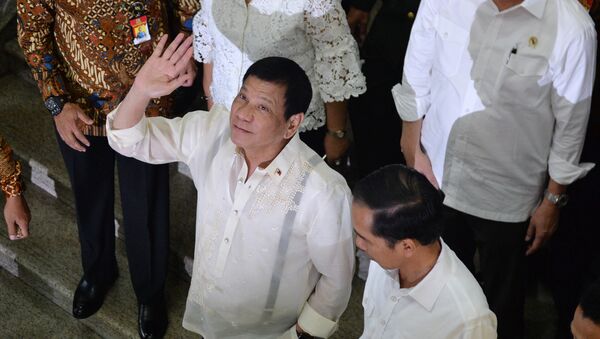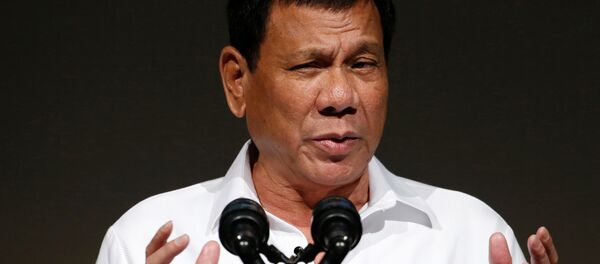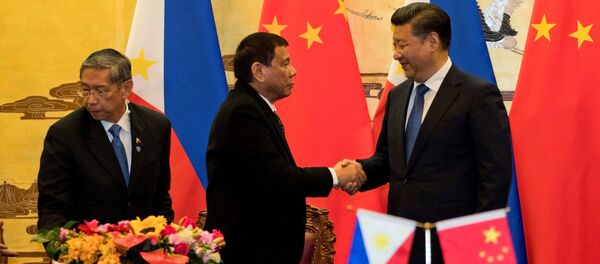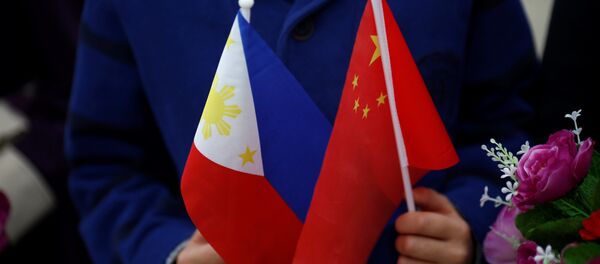Sputnik Japan correspondent Asuka Tokuyama spoke in an interview with Wataru Kusaka, a professor of international studies at the graduate school of Nagoya University, specializing in Philippine politics, about the puzzling president of the Philippines.
“In 1960, when the President of the Philippines was in college, there was an ongoing student movement. Rodrigo Duterte belonged to the post-war generation of the baby boomers and he was influenced by ultra-nationalism. His favorite teacher was José Maria Sison who later established the Communist Party of the Philippines,” Kusaka said.
He further said that, “the ideology of the ultra-nationalism, which came from the student movement, became part of the ideology of Rodrigo Duterte. His idea is to ‘create the Philippines free from American influence,’” the professor added.
Talking about the relations between the Philippines and the US, the professor said that initially the relations were not so bad; “there was a time when America was an important partner.”
However, with the arrival of President Duterte, America began to strongly criticize the anti-drug measures carried out in the Philippines that sparked Duterte’s anti-American sentiment.
“The US treated the Philippines with superiority as if reading a sermon. President Duterte took it as: ‘they do not respect me and therefore, they do not respect the Philippines,’” Kusaka told Sputnik.
The professor further said that the US since the invasion of the Philippines in the early 20th century, had political, economic and military influence in the country. However, since the arrival of Duterte, the US is losing its grip on the country.
“The fact that the Philippines has moved on to China is a gross miscalculation of Obama. I think now the US president regrets that he canceled the meeting in Laos,” Kusaka said.
Last month, Duterte, right before the Philippine-US Summit in Laos, insulted the US president which resulted in Obama canceling their meeting.
Kusaka is convinced that behind the harsh anti-American sentiment coming from Duterte, hides the fact that the president is convinced that his country can advance its economy without the US.
“Against the background of a relative decline of trade turnover of the Philippines with the United States, the Philippines is increasing its trade turnover with China, Japan and the ASEAN countries. Initially, in the Philippines, powerful landowners grew sugarcane plantations on their lands and sold it in America. People got so wealthy and powerful they began to govern the country,” Kusaka said.
According to the professor, the former President of the Philippines, Corazon Aquino was one of such landowners turned president. However, with the coming of Duterte this ideology is changing.
“President Duterte is fighting these lawful owners who have accumulated their fortunes based on such contacts with the United States which have lasted for over 100 years.”
“Duterte, by improving relations with China, wants, among other things, to change the arrangement of the economic elite in the Philippines,” Kusaka said.
According to Kusaka, the president's statement about his intention to confront the world by partnering the Philippines with China and Russia raised eyebrows even in the Philippines.
“President Duterte feels a sense of admiration and confidence in strong leaders. He believes in building friendly relations with such strong leaders as Russian President, Putin. However, currently, it is unclear how exactly the Philippines will be associated with Russia,” Kusaka said.
According to the professor, Duterte also feels strongly about building good relations with Japan. On a number of occasions, he has called Japan his “main ally.”
“During the current visit of President Duterte, Japan has a heavy burden on its shoulders. The US is facing worsened relations with the Philippines and wants to preserve its influence in the Philippines via Japan. The US has likely asked Prime Minister Abe to assist so that the Philippines does not go over to the Chinese side,” Kusaka said.
The professor added that this time around, the Japanese government has even set up a meeting with the emperor as a winner card, which would demonstrate Japan’s warm welcome to Duterte and respect for the Philippines.
Duterte in his turn has already mentioned his willingness to visit Japan once again in November, however, immediately after Japan, the president is planning to visit Russia and meet with President Putin.
Hence, as Kusaka noted, for now it remains unclear where the Philippines’ diplomacy headed by Rodrigo Duterte will take the country in the future.





